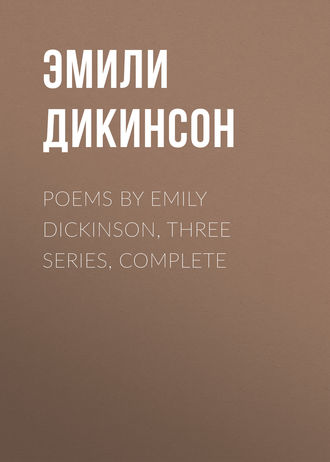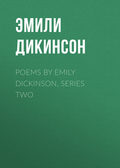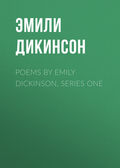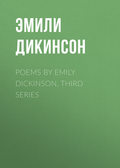полная версия

Эмили Дикинсон
Poems by Emily Dickinson, Three Series, Complete
"Which in the valleys lie?"
Some shook their heads, and others smiled,
And no one made reply.
"Perhaps they did not hear," I said;
"I will inquire again.
Whose are the beds, the tiny beds
So thick upon the plain?"
"'T is daisy in the shortest;
A little farther on,
Nearest the door to wake the first,
Little leontodon.
"'T is iris, sir, and aster,
Anemone and bell,
Batschia in the blanket red,
And chubby daffodil."
Meanwhile at many cradles
Her busy foot she plied,
Humming the quaintest lullaby
That ever rocked a child.
"Hush! Epigea wakens! —
The crocus stirs her lids,
Rhodora's cheek is crimson, —
She's dreaming of the woods."
Then, turning from them, reverent,
"Their bed-time 't is," she said;
"The bumble-bees will wake them
When April woods are red."
XI
MY ROSE
Pigmy seraphs gone astray,
Velvet people from Vevay,
Belles from some lost summer day,
Bees' exclusive coterie.
Paris could not lay the fold
Belted down with emerald;
Venice could not show a cheek
Of a tint so lustrous meek.
Never such an ambuscade
As of brier and leaf displayed
For my little damask maid.
I had rather wear her grace
Than an earl's distinguished face;
I had rather dwell like her
Than be Duke of Exeter
Royalty enough for me
To subdue the bumble-bee!
XII
THE ORIOLE'S SECRET
To hear an oriole sing
May be a common thing,
Or only a divine.
It is not of the bird
Who sings the same, unheard,
As unto crowd.
The fashion of the ear
Attireth that it hear
In dun or fair.
So whether it be rune,
Or whether it be none,
Is of within;
The "tune is in the tree,"
The sceptic showeth me;
"No, sir! In thee!"
XIII
THE ORIOLE
One of the ones that Midas touched,
Who failed to touch us all,
Was that confiding prodigal,
The blissful oriole.
So drunk, he disavows it
With badinage divine;
So dazzling, we mistake him
For an alighting mine.
A pleader, a dissembler,
An epicure, a thief, —
Betimes an oratorio,
An ecstasy in chief;
The Jesuit of orchards,
He cheats as he enchants
Of an entire attar
For his decamping wants.
The splendor of a Burmah,
The meteor of birds,
Departing like a pageant
Of ballads and of bards.
I never thought that Jason sought
For any golden fleece;
But then I am a rural man,
With thoughts that make for peace.
But if there were a Jason,
Tradition suffer me
Behold his lost emolument
Upon the apple-tree.
XIV
IN SHADOW
I dreaded that first robin so,
But he is mastered now,
And I 'm accustomed to him grown, —
He hurts a little, though.
I thought if I could only live
Till that first shout got by,
Not all pianos in the woods
Had power to mangle me.
I dared not meet the daffodils,
For fear their yellow gown
Would pierce me with a fashion
So foreign to my own.
I wished the grass would hurry,
So when 't was time to see,
He 'd be too tall, the tallest one
Could stretch to look at me.
I could not bear the bees should come,
I wished they 'd stay away
In those dim countries where they go:
What word had they for me?
They 're here, though; not a creature failed,
No blossom stayed away
In gentle deference to me,
The Queen of Calvary.
Each one salutes me as he goes,
And I my childish plumes
Lift, in bereaved acknowledgment
Of their unthinking drums.
XV
THE HUMMING-BIRD
A route of evanescence
With a revolving wheel;
A resonance of emerald,
A rush of cochineal;
And every blossom on the bush
Adjusts its tumbled head, —
The mail from Tunis, probably,
An easy morning's ride.
XVI
SECRETS
The skies can't keep their secret!
They tell it to the hills —
The hills just tell the orchards —
And they the daffodils!
A bird, by chance, that goes that way
Soft overheard the whole.
If I should bribe the little bird,
Who knows but she would tell?
I think I won't, however,
It's finer not to know;
If summer were an axiom,
What sorcery had snow?
So keep your secret, Father!
I would not, if I could,
Know what the sapphire fellows do,
In your new-fashioned world!
XVII
Who robbed the woods,
The trusting woods?
The unsuspecting trees
Brought out their burrs and mosses
His fantasy to please.
He scanned their trinkets, curious,
He grasped, he bore away.
What will the solemn hemlock,
What will the fir-tree say?
XVIII
TWO VOYAGERS
Two butterflies went out at noon
And waltzed above a stream,
Then stepped straight through the firmament
And rested on a beam;
And then together bore away
Upon a shining sea, —
Though never yet, in any port,
Their coming mentioned be.
If spoken by the distant bird,
If met in ether sea
By frigate or by merchantman,
Report was not to me.
XIX
BY THE SEA
I started early, took my dog,
And visited the sea;
The mermaids in the basement
Came out to look at me,
And frigates in the upper floor
Extended hempen hands,
Presuming me to be a mouse
Aground, upon the sands.
But no man moved me till the tide
Went past my simple shoe,
And past my apron and my belt,
And past my bodice too,
And made as he would eat me up
As wholly as a dew
Upon a dandelion's sleeve —
And then I started too.
And he – he followed close behind;
I felt his silver heel
Upon my ankle, – then my shoes
Would overflow with pearl.
Until we met the solid town,
No man he seemed to know;
And bowing with a mighty look
At me, the sea withdrew.
XX
OLD-FASHIONED
Arcturus is his other name, —
I'd rather call him star!
It's so unkind of science
To go and interfere!
I pull a flower from the woods, —
A monster with a glass
Computes the stamens in a breath,
And has her in a class.
Whereas I took the butterfly
Aforetime in my hat,
He sits erect in cabinets,
The clover-bells forgot.
What once was heaven, is zenith now.
Where I proposed to go
When time's brief masquerade was done,
Is mapped, and charted too!
What if the poles should frisk about
And stand upon their heads!
I hope I 'm ready for the worst,
Whatever prank betides!
Perhaps the kingdom of Heaven 's changed!
I hope the children there
Won't be new-fashioned when I come,
And laugh at me, and stare!
I hope the father in the skies
Will lift his little girl, —
Old-fashioned, naughty, everything, —
Over the stile of pearl!
XXI
A TEMPEST
An awful tempest mashed the air,
The clouds were gaunt and few;
A black, as of a spectre's cloak,
Hid heaven and earth from view.
The creatures chuckled on the roofs
And whistled in the air,
And shook their fists and gnashed their teeth.
And swung their frenzied hair.
The morning lit, the birds arose;
The monster's faded eyes
Turned slowly to his native coast,
And peace was Paradise!
XXII
THE SEA
An everywhere of silver,
With ropes of sand
To keep it from effacing
The track called land.
XXIII
IN THE GARDEN
A bird came down the walk:
He did not know I saw;
He bit an angle-worm in halves
And ate the fellow, raw.
And then he drank a dew
From a convenient grass,
And then hopped sidewise to the wall
To let a beetle pass.
He glanced with rapid eyes
That hurried all abroad, —
They looked like frightened beads, I thought;
He stirred his velvet head
Like one in danger; cautious,
I offered him a crumb,
And he unrolled his feathers
And rowed him softer home
Than oars divide the ocean,
Too silver for a seam,
Or butterflies, off banks of noon,
Leap, plashless, as they swim.
XXIV
THE SNAKE
A narrow fellow in the grass
Occasionally rides;
You may have met him, – did you not,
His notice sudden is.
The grass divides as with a comb,
A spotted shaft is seen;
And then it closes at your feet
And opens further on.
He likes a boggy acre,
A floor too cool for corn.
Yet when a child, and barefoot,
I more than once, at morn,
Have passed, I thought, a whip-lash
Unbraiding in the sun, —
When, stooping to secure it,
It wrinkled, and was gone.
Several of nature's people
I know, and they know me;
I feel for them a transport
Of cordiality;
But never met this fellow,
Attended or alone,
Without a tighter breathing,
And zero at the bone.
XXV
THE MUSHROOM
The mushroom is the elf of plants,
At evening it is not;
At morning in a truffled hut
It stops upon a spot
As if it tarried always;
And yet its whole career
Is shorter than a snake's delay,
And fleeter than a tare.
'T is vegetation's juggler,
The germ of alibi;
Doth like a bubble antedate,
And like a bubble hie.
I feel as if the grass were pleased
To have it intermit;
The surreptitious scion
Of summer's circumspect.
Had nature any outcast face,
Could she a son contemn,
Had nature an Iscariot,
That mushroom, – it is him.
XXVI
THE STORM
There came a wind like a bugle;
It quivered through the grass,
And a green chill upon the heat
So ominous did pass
We barred the windows and the doors
As from an emerald ghost;
The doom's electric moccason
That very instant passed.
On a strange mob of panting trees,
And fences fled away,
And rivers where the houses ran
The living looked that day.
The bell within the steeple wild
The flying tidings whirled.
How much can come
And much can go,
And yet abide the world!
XXVII
THE SPIDER
A spider sewed at night
Without a light
Upon an arc of white.
If ruff it was of dame
Or shroud of gnome,
Himself, himself inform.
Of immortality
His strategy
Was physiognomy.
XXVIII
I know a place where summer strives
With such a practised frost,
She each year leads her daisies back,
Recording briefly, "Lost."
But when the south wind stirs the pools
And struggles in the lanes,
Her heart misgives her for her vow,
And she pours soft refrains
Into the lap of adamant,
And spices, and the dew,
That stiffens quietly to quartz,
Upon her amber shoe.
XXIX
The one that could repeat the summer day
Were greater than itself, though he
Minutest of mankind might be.
And who could reproduce the sun,
At period of going down —
The lingering and the stain, I mean —
When Orient has been outgrown,
And Occident becomes unknown,
His name remain.
XXX
THE WlND'S VISIT
The wind tapped like a tired man,
And like a host, "Come in,"
I boldly answered; entered then
My residence within
A rapid, footless guest,
To offer whom a chair
Were as impossible as hand
A sofa to the air.
No bone had he to bind him,
His speech was like the push
Of numerous humming-birds at once
From a superior bush.
His countenance a billow,
His fingers, if he pass,
Let go a music, as of tunes
Blown tremulous in glass.
He visited, still flitting;
Then, like a timid man,
Again he tapped – 't was flurriedly —
And I became alone.
XXXI
Nature rarer uses yellow
Than another hue;
Saves she all of that for sunsets, —
Prodigal of blue,
Spending scarlet like a woman,
Yellow she affords
Only scantly and selectly,
Like a lover's words.
XXXII
GOSSIP
The leaves, like women, interchange
Sagacious confidence;
Somewhat of nods, and somewhat of
Portentous inference,
The parties in both cases
Enjoining secrecy, —
Inviolable compact
To notoriety.
XXXIII
SIMPLICITY
How happy is the little stone
That rambles in the road alone,
And doesn't care about careers,
And exigencies never fears;
Whose coat of elemental brown
A passing universe put on;
And independent as the sun,
Associates or glows alone,
Fulfilling absolute decree
In casual simplicity.
XXXIV
STORM
It sounded as if the streets were running,
And then the streets stood still.
Eclipse was all we could see at the window,
And awe was all we could feel.
By and by the boldest stole out of his covert,
To see if time was there.
Nature was in her beryl apron,
Mixing fresher air.
XXXV
THE RAT
The rat is the concisest tenant.
He pays no rent, —
Repudiates the obligation,
On schemes intent.
Balking our wit
To sound or circumvent,
Hate cannot harm
A foe so reticent.
Neither decree
Prohibits him,
Lawful as
Equilibrium.
XXXVI
Frequently the woods are pink,
Frequently are brown;
Frequently the hills undress
Behind my native town.
Oft a head is crested
I was wont to see,
And as oft a cranny
Where it used to be.
And the earth, they tell me,
On its axis turned, —
Wonderful rotation
By but twelve performed!
XXXVII
A THUNDER-STORM
The wind begun to rock the grass
With threatening tunes and low, —
He flung a menace at the earth,
A menace at the sky.
The leaves unhooked themselves from trees
And started all abroad;
The dust did scoop itself like hands
And throw away the road.
The wagons quickened on the streets,
The thunder hurried slow;
The lightning showed a yellow beak,
And then a livid claw.
The birds put up the bars to nests,
The cattle fled to barns;
There came one drop of giant rain,
And then, as if the hands
That held the dams had parted hold,
The waters wrecked the sky,
But overlooked my father's house,
Just quartering a tree.
XXXVIII
WITH FLOWERS
South winds jostle them,
Bumblebees come,
Hover, hesitate,
Drink, and are gone.
Butterflies pause
On their passage Cashmere;
I, softly plucking,
Present them here!
XXXIX
SUNSET
Where ships of purple gently toss
On seas of daffodil,
Fantastic sailors mingle,
And then – the wharf is still.
XL
She sweeps with many-colored brooms,
And leaves the shreds behind;
Oh, housewife in the evening west,
Come back, and dust the pond!
You dropped a purple ravelling in,
You dropped an amber thread;
And now you 've littered all the East
With duds of emerald!
And still she plies her spotted brooms,
And still the aprons fly,
Till brooms fade softly into stars —
And then I come away.
XLI
Like mighty footlights burned the red
At bases of the trees, —
The far theatricals of day
Exhibiting to these.
'T was universe that did applaud
While, chiefest of the crowd,
Enabled by his royal dress,
Myself distinguished God.
XLII
PROBLEMS
Bring me the sunset in a cup,
Reckon the morning's flagons up,
And say how many dew;
Tell me how far the morning leaps,
Tell me what time the weaver sleeps
Who spun the breadths of blue!
Write me how many notes there be
In the new robin's ecstasy
Among astonished boughs;
How many trips the tortoise makes,
How many cups the bee partakes, —
The debauchee of dews!
Also, who laid the rainbow's piers,
Also, who leads the docile spheres
By withes of supple blue?
Whose fingers string the stalactite,
Who counts the wampum of the night,
To see that none is due?
Who built this little Alban house
And shut the windows down so close
My spirit cannot see?
Who 'll let me out some gala day,
With implements to fly away,
Passing pomposity?
XLIII
THE JUGGLER OF DAY
Blazing in gold and quenching in purple,
Leaping like leopards to the sky,
Then at the feet of the old horizon
Laying her spotted face, to die;
Stooping as low as the otter's window,
Touching the roof and tinting the barn,
Kissing her bonnet to the meadow, —
And the juggler of day is gone!
XLIV
MY CRICKET
Farther in summer than the birds,
Pathetic from the grass,
A minor nation celebrates
Its unobtrusive mass.
No ordinance is seen,
So gradual the grace,
A pensive custom it becomes,
Enlarging loneliness.
Antiquest felt at noon
When August, burning low,
Calls forth this spectral canticle,
Repose to typify.
Remit as yet no grace,
No furrow on the glow,
Yet a druidic difference
Enhances nature now.
XLV
As imperceptibly as grief
The summer lapsed away, —
Too imperceptible, at last,
To seem like perfidy.
A quietness distilled,
As twilight long begun,
Or Nature, spending with herself
Sequestered afternoon.
The dusk drew earlier in,
The morning foreign shone, —
A courteous, yet harrowing grace,
As guest who would be gone.
And thus, without a wing,
Or service of a keel,
Our summer made her light escape
Into the beautiful.
XLVI
It can't be summer, – that got through;
It 's early yet for spring;
There 's that long town of white to cross
Before the blackbirds sing.
It can't be dying, – it's too rouge, —
The dead shall go in white.
So sunset shuts my question down
With clasps of chrysolite.
XLVII
SUMMER'S OBSEQUIES
The gentian weaves her fringes,
The maple's loom is red.
My departing blossoms
Obviate parade.
A brief, but patient illness,
An hour to prepare;
And one, below this morning,
Is where the angels are.
It was a short procession, —
The bobolink was there,
An aged bee addressed us,
And then we knelt in prayer.
We trust that she was willing, —
We ask that we may be.
Summer, sister, seraph,
Let us go with thee!
In the name of the bee
And of the butterfly
And of the breeze, amen!
XLVIII
FRINGED GENTIAN
God made a little gentian;
It tried to be a rose
And failed, and all the summer laughed.
But just before the snows
There came a purple creature
That ravished all the hill;
And summer hid her forehead,
And mockery was still.
The frosts were her condition;
The Tyrian would not come
Until the North evoked it.
"Creator! shall I bloom?"
XLIX
NOVEMBER
Besides the autumn poets sing,
A few prosaic days
A little this side of the snow
And that side of the haze.
A few incisive mornings,
A few ascetic eyes, —
Gone Mr. Bryant's golden-rod,
And Mr. Thomson's sheaves.
Still is the bustle in the brook,
Sealed are the spicy valves;
Mesmeric fingers softly touch
The eyes of many elves.
Perhaps a squirrel may remain,
My sentiments to share.
Grant me, O Lord, a sunny mind,
Thy windy will to bear!
L
THE SNOW
It sifts from leaden sieves,
It powders all the wood,
It fills with alabaster wool
The wrinkles of the road.
It makes an even face
Of mountain and of plain, —
Unbroken forehead from the east
Unto the east again.
It reaches to the fence,
It wraps it, rail by rail,
Till it is lost in fleeces;
It flings a crystal veil
On stump and stack and stem, —
The summer's empty room,
Acres of seams where harvests were,
Recordless, but for them.
It ruffles wrists of posts,
As ankles of a queen, —
Then stills its artisans like ghosts,
Denying they have been.
LI
THE BLUE JAY
No brigadier throughout the year
So civic as the jay.
A neighbor and a warrior too,
With shrill felicity
Pursuing winds that censure us
A February day,
The brother of the universe
Was never blown away.
The snow and he are intimate;
I 've often seen them play
When heaven looked upon us all
With such severity,
I felt apology were due
To an insulted sky,
Whose pompous frown was nutriment
To their temerity.
The pillow of this daring head
Is pungent evergreens;
His larder – terse and militant —
Unknown, refreshing things;
His character a tonic,
His future a dispute;
Unfair an immortality
That leaves this neighbor out.
IV. TIME AND ETERNITY
I
Let down the bars, O Death!
The tired flocks come in
Whose bleating ceases to repeat,
Whose wandering is done.
Thine is the stillest night,
Thine the securest fold;
Too near thou art for seeking thee,
Too tender to be told.
II
Going to heaven!
I don't know when,
Pray do not ask me how, —
Indeed, I 'm too astonished
To think of answering you!
Going to heaven! —
How dim it sounds!
And yet it will be done
As sure as flocks go home at night
Unto the shepherd's arm!
Perhaps you 're going too!
Who knows?
If you should get there first,
Save just a little place for me
Close to the two I lost!
The smallest "robe" will fit me,
And just a bit of "crown;"
For you know we do not mind our dress
When we are going home.
I 'm glad I don't believe it,
For it would stop my breath,
And I 'd like to look a little more
At such a curious earth!
I am glad they did believe it
Whom I have never found
Since the mighty autumn afternoon
I left them in the ground.
III
At least to pray is left, is left.
O Jesus! in the air
I know not which thy chamber is, —
I 'm knocking everywhere.
Thou stirrest earthquake in the South,
And maelstrom in the sea;
Say, Jesus Christ of Nazareth,
Hast thou no arm for me?
IV
EPITAPH
Step lightly on this narrow spot!
The broadest land that grows
Is not so ample as the breast
These emerald seams enclose.
Step lofty; for this name is told
As far as cannon dwell,
Or flag subsist, or fame export
Her deathless syllable.
V
Morns like these we parted;
Noons like these she rose,
Fluttering first, then firmer,
To her fair repose.
Never did she lisp it,
And 't was not for me;
She was mute from transport,
I, from agony!
Till the evening, nearing,
One the shutters drew —
Quick! a sharper rustling!
And this linnet flew!
VI
A death-blow is a life-blow to some
Who, till they died, did not alive become;
Who, had they lived, had died, but when
They died, vitality begun.
VII
I read my sentence steadily,
Reviewed it with my eyes,
To see that I made no mistake
In its extremest clause, —
The date, and manner of the shame;
And then the pious form
That "God have mercy" on the soul
The jury voted him.
I made my soul familiar
With her extremity,
That at the last it should not be
A novel agony,
But she and Death, acquainted,
Meet tranquilly as friends,
Salute and pass without a hint —
And there the matter ends.
VIII
I have not told my garden yet,
Lest that should conquer me;
I have not quite the strength now
To break it to the bee.
I will not name it in the street,
For shops would stare, that I,
So shy, so very ignorant,
Should have the face to die.
The hillsides must not know it,
Where I have rambled so,
Nor tell the loving forests
The day that I shall go,
Nor lisp it at the table,
Nor heedless by the way
Hint that within the riddle
One will walk to-day!
IX
THE BATTLE-FIELD
They dropped like flakes, they dropped like stars,





